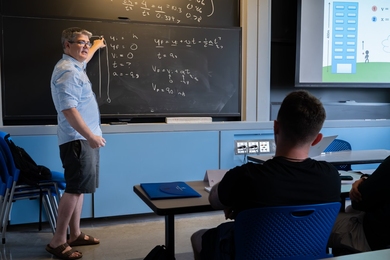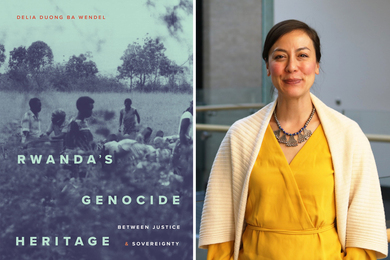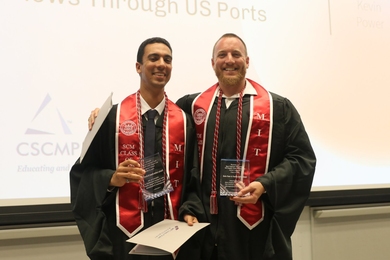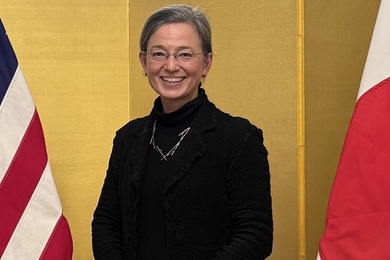An MIT professor and a graduate of its PhD program in chemistry will be featured this spring in a Public Broadcasting System documentary series about the lives of six women scientists.
The MIT participants are Dr. Marcia K. McNutt, professor of marine geophysics, and Dr. Lynda Jordan, an associate professor of chemistry at North Carolina Agricultural and Technical (A&T) State University who received the PhD in biological chemistry from MIT in 1985.
The series, titled "Discovering Women," is being produced for national broadcast by Boston's WGBH-TV. By doing profiles of six women scientists of various ages and ethnic backgrounds, it is intended to encourage young women to pursue careers in science.
The series will air on three consecutive Wednesdays in 1995-March 29, April 5 and April 12-from 9-11pm.
As an accompaniment to the series, WGBH has also developed an extensive outreach campaign targeting middle-school students and designed to get them to interview women scientists in their communities. The purpose of the campaign is to help students break down stereotypes about who people in the sciences are, and to spark their own interest in careers in science.
A Minnesota native, Professor McNutt told MIT Spectrum that she was interested in science as a child-but not that interested.
Later, when she entered Colorado College, she had enough of a scientific orientation to major in physics. A mentor in her department ("he was one of the few faculty members who took me seriously") urged her to apply to graduate school.
Professor McNutt had had a fascination with the oceans dating back to California visits with her grandmother, and she loved the outdoors.
These sentiments gave strong weight to her choice of marine geophysics, as did a memorable college experience. As part of a geology course, a professor took an entire class out for a month of exploration in Colorado's mountains. "That course made a big impression on me," Professor McNutt said. "It was science on such a grand scale."
Professor McNutt received her doctorate from California's Scripps Oceanographic Institution, and then worked three years as a federal government researcher before joining the MIT faculty in 1983. An added draw was MIT's ties with the Woods Hole Oceanographic Institution through the MIT-WHOI Joint Program in Oceanography and Ocean Engineering.
Professor McNutt's 15 years as a geophysicist haven't dampened her enthusiasm for the field. "What's nice about geophysics," she said, "is that it's not always apparent what needs to be done next, and you often find that taking a circuitous route is the quickest way to get from A to B."
The segment on Dr. McNutt will be called "Earth Explorer."
Dr. Jordan's inspirational path to the world of science began in a Boston housing project where she grew up in an African-American family of 18 children. Through her own determination and the encouragement of caring adults, she graduated from college-the first in her family to do so-before going on to get her doctorate at MIT.
In an article in the Greensboro, NC, News and Record, she credits many people with helping her and serving as role models, and now she's become a role model herself.
Professor Jordan's life might well have taken a different turn had it not been for her first mentor, Joseph Warren, an A&T graduate who headed Brandeis University's Upward Bound Program which Dr. Jordan attended during high school.
"He got me interested in school and A&T," Dr. Jordan said. "That was a critical time in my life. He made sure I had what I needed for college. He bought my plane ticket and gave me spending money. He said I needed to be here. I needed to get away and be around a strong black environment, especially strong black women. I didn't fully understand what he meant until I came back here as a professor."
When she arrived at A&T at 17, she initially was a nursing major. But she soon switched to chemistry and her career choice to medicine. After attending the Harvard Health Careers Program one summer during college, she narrowed her career interest further to biochemistry, a field that helps develop new ways to fight disease.
"I said, if I want to make a contribution to medicine, this is where I want to make it-in diseases."
That's what led to her current research on enzymes.
Today she teaches biochemistry and chemistry and carries out research on an enzyme, phospholipase A2, which has been implicated in diseases such as asthma, arthritis and diabetes.
"She's truly a role model-she's so giving," said Dr. Vallerie Guthrie, a chemistry professor who has known Dr. Jordan since she was a freshman at A&T 20 years ago. "That's important as an African American because there are so few of us."
The PBS segment on Dr. Jordan will be titled "Jewels in a Test Tube."
"That relates to something (Dr. Jordan) said in terms of research," said Yvonne Smith, the show's producer. "She said what a wonderful treat it is never to know what you are going to find. Sometimes you find a jewel."
A version of this article appeared in MIT Tech Talk on March 22, 1995.





